How many times have you found yourself going beyond the first couple of pages of Google when you search for something?
My guess is, not too often!
This is EXACT reason why so many affiliate bloggers dream of landing on the first page of the search engine results pages (SERPs) with their content.
Obviously, there are many types of affiliates out there, including social media marketers, email marketers, and PPC affiliates. But one of the best options for a serious affiliate marketer is SEO.
In this guide, I share how step-by-step how you can become an SEO content publisher through quality affiliate marketing keyword research.
First Steps: Niche, Domain, Website
The SEO/organic content route is a great option for less saturated niches and those that Google is comfortable ranking you on. Additionally, when you have a great strategy in place, SEO affiliate marketing can grow at a faster pace than most other forms of marketing, because organic content naturally has higher trustworthiness than promoted content.
So, how do you get started?
This is probably a no-brainer, but the very first main step in your SEO affiliate marketing journey is to build an affiliate website.
But before you can do that, you need to finalize two things:
- Your affiliate marketing niche
- Your domain name
Define Your Zone of Expertise
Since you have decided to take the blogging approach to affiliate marketing, you need to finalize on a niche that will make your business more profitable, fast. In SEO, certain keywords can be highly competitive, meaning that more and more websites are competing with each other to rank higher for those keywords.
If your niche is from the “Your Money/Your Life” (YMYL) category, ranking your new website can take longer – or potentially never break through. So, using SEO as a primary source of traffic for niches like health and fitness or personal finance may not be as good of an idea.
Similarly, if you target broad niche at first, your website won’t rank quickly.
Instead, go narrow.
For example, take popular niches like “personal finance” or “physical fitness.”
A niche within these sub-niches could be “personal finance for students” or “physical fitness for pregnant women.” The competition for keywords surrounding these specific niches is probably a lot lower, which means your website can rank higher, faster.

Pick a “Sticky” Domain
Once you have a suitable niche in mind, the next step is to brainstorm a ‘sticky’ domain for your website. A sticky domain means a website name that ‘sticks’ with the viewer in one go!
A sticky domain plays a crucial role in building a trustworthy brand. As users begin to interact and go through your website more and more, and as they find your content valuable, they might actively look for your website the next time they want to read a review, learn how to do something, or check out a buying guide!
A domain is sticky when it:
- Is easy to pronounce
- Has fewer syllables
- Is unique enough to leave an impression
- Is easy to spell and does NOT have many extra vowels or letters.
In fact, if you can find a domain relevant to your niche, you’ve hit the jackpot! When it comes to SEO, having relevant keywords in your URL can help you rank higher in the SERPs.
Build a Website
Building a website can seem daunting for beginners. But with website building tools and platforms like WordPress on the market, it couldn’t be easier.
Simply follow ClickBank’s comprehensive guide to build an affiliate website! We walk you through the entire process of creating a website for affiliate marketing, plus a few key tips to remember when you want to monetize an affiliate site.
Once you’ve built a website to your liking, you can start learning how keyword research for an affiliate website works!
The 3 Types of Keywords
An affiliate website is only as good as the content that appears on it. And for the purposes of a money-making blog, you need to be deliberate about which keywords your content is targeting.
So, let’s talk about keywords!
When it comes to online search, there are 3 main types of keywords:
- Informational
- Navigational
- Transactional/Commercial
One of the main factors to consider when picking keywords is the search intent of your readers (i.e. the likely purpose behind a particular Google search).
When it comes to affiliate marketing, your readers’ ideal search intent should be to buy something, also known as transactional or commercial intent.
So, we want to gravitate primarily toward those commercial keywords for most of your content, with the occasional informational (how-to or ultimate guide) thrown in.
Here are some examples of transactional/commercial keywords:
- Best party planners near me
- Toshiba vs Asus laptops
- Tuition at Tulane University
- Affordable tap dancing shoes
What do they all have in common?
You guessed it: the “intent to buy.”
3 Types of Transactional Keywords
There are also different types of transactional keywords.
Each keyword type has a slightly different purpose, but they’re all equally important for your affiliate marketing blog to be more inclusive and attract all types of buyers. These will also help you make your keyword research more objective-focused.
Here are the 3 types of transactional keywords that your research should be focused on:
- General comparison keywords
- Branded comparison keywords
- Product review focused keywords
Let’s dive into each of these one by one!
1) General Comparison Keywords
General comparison keywords are the easiest to spot. They follow a “best xyz product” format in the title.
For example, if you’re an affiliate marketer who promotes phones, a general comparison keyword would be “best phones under xyz amount.”

In these blog posts, you can review a few top-selling or respected products and help the customer make a decision.
These types of transactional keywords are important because they help you create articles that are targeted towards people who have already decided that they are going to buy a certain type of product.
Now, your blog can help them pick the product that fits their needs the best!
2) Brand Comparison Keywords
Brand comparison keywords focus on products produced by different brands, rather than a random comparison between products. For example, if your niche is smartphones, then your brand comparison keyword could be a variant of “Samsung vs. Apple.”
These keywords allow you to target people who are trying to decide between brands with a strong following.
In fact, brand comparison keywords can also allow you to create posts where you compare two different products from the same brand.

When you compare two different products of the same brand, you can reach those buyers who are loyal to a specific brand. In this case, your blog will help them decide between two products based on price point and an analysis of features and benefits.
3) Product Review Focused Keywords
One of the best affiliate marketing tips you will ever get is to create product reviews for the products in your chosen niche.
These keywords typically come in the format of something like “<product> review 2022” or “honest <product> review.”
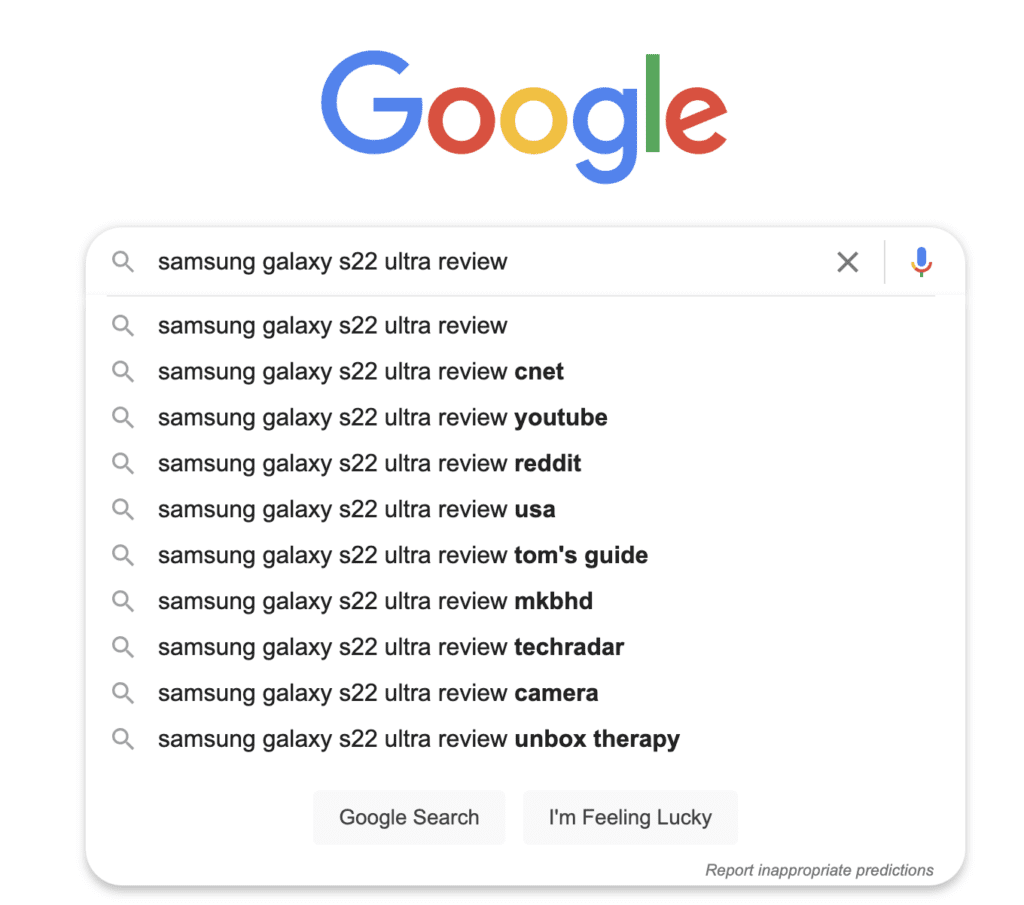
Product reviews have a “buying intent” at the core. A reader will typically click on these reviews if they are considering buying a product and want to be informed about it.
So, these types of reviews dramatically increase your chances of making a sale through your website!
Keywords Focused on Trust & Authority
In addition to the transactional keywords that we discussed, you should also target keywords that are non-commercial in nature.
“Trust & authority” keywords focus more on educating/informing the reader, rather than trying to get them to buy something. When you rank for trust & authority keywords, you’re building your website’s trust and authority online and with search engines like Google.
One reason these non-commercial keywords are so important is because they’re more likely to attract backlinks from other websites that want to source informative blog posts. (For obvious reasons, review articles are less link-worthy – unless you can include a TON of original information and data in yours!)
Another advantage of including these keywords in your content strategy is that your audience will grow to trust your brand. Showcasing expertise in your niche will earn you more credibility than a product review ever could.
Here are some examples of authority-focused keywords:
- Things to remember when investing in a gaming set-up
- Is “xyz” product for you or not?
- Checklist for your ideal home theater setup
- Should you buy an advanced or basic PC?
5 Keyword Research Tools You Can Use
Keyword research has become a foundational aspect for all marketers, but it’s particularly important for affiliates who promote products through their websites. Most marketers use some kind of keyword research tool to assist them in their blog content strategy.
I’ve put together a list of the top 5 keyword research tools you can explore in your affiliate marketing journey. Let’s take a look!
1) Google
While the search engine itself is not a keyword research tool, it can be used to gain some great insights while coming up with a shortlist of target search terms.
This method is often used by beginners in this space, as it’s the simplest (and least expensive) way to determine what’s ranking and how much potential you have to rank too.

For example, in the above screenshot, the number of search results can give you a sense of how competitive the keyword is. Are the top ranking results from websites you’ve heard of before?
Do the results look like they do a great job of answering the query you’re considering, or are there are lot of irrelevant results that you could improve on with your own content?
Also, check out the questions in the “People also ask” box for more ideas of topics your audience may be expecting!
You can elevate the value you get from Google by adding Chrome extensions such as Keywords Everywhere and Whatsmyserp to your browser. These extensions provide extra data to help you optimize your keyword strategy right in Google.
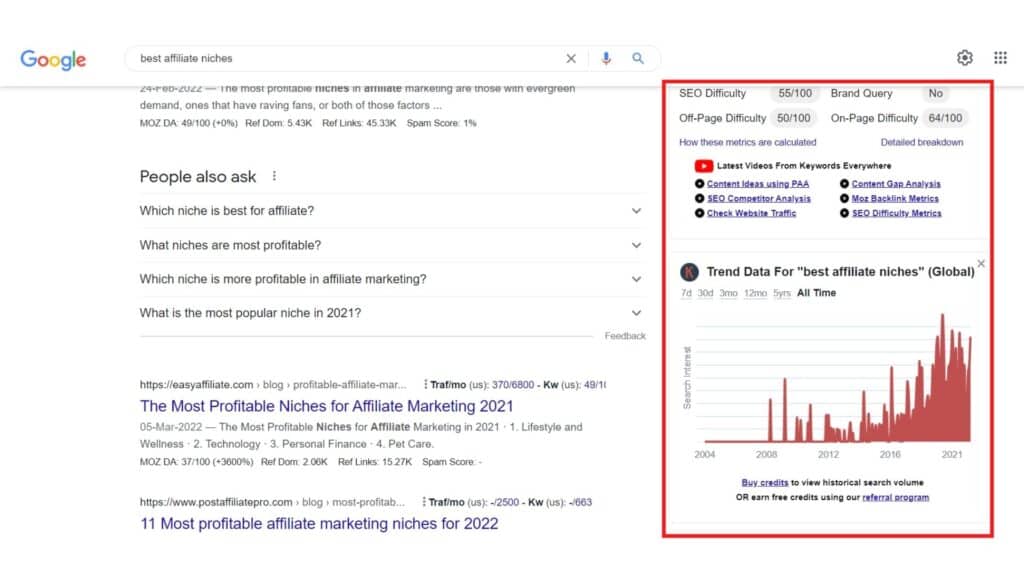
Features of Keywords Everywhere:
- Allows you to download your list of keywords in Excel, CSV, or PDF formats
- Allows you to save all keywords present on a page for future reference and research
- Allows you to run a country-specific search to optimize your strategy further
- Supports 16 APIs including Google Search, Google Trends, Google Analytics, Soovle, Answer the Public, etc.
- Analyzes any given page and gives you data regarding volume, SEO difficulty, and other metrics as shown in the screenshot above
However, if you’re headed that deep into the SEO rabbit hole, you might want to invest in some paid tools that offer better data and more versatility than a simple Google search can provide.
2) Google Keyword Planner
Google Keyword Planner is a free tool used by many marketers for their keyword research activities. You need to sign up on the Google Adwords platform to gain access to this tool.
This is a great tool for beginners and for marketers because the insights are highly relevant and actionable. People who have a lower budget and cannot invest in paid tools yet can still get some decent information through this tool.
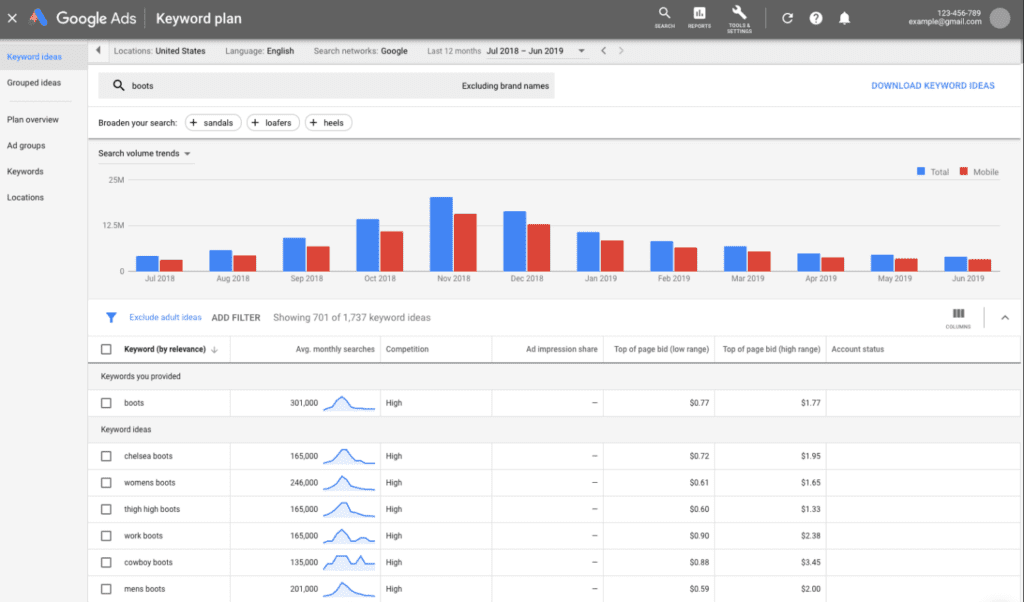
Features of Google Keyword Planner:
- Discover new keyword suggestions based on the keywords you add
- Separate types of keywords into ‘groups’ for better categorization
- Get detailed monthly insights, including search volume trends
- Add keywords to your plan to see a performance forecast
- If you plan to run campaign ads for your website, determine estimated costs for each targeted keyword
- Use different filters to get relevant insights, including location-based metrics
3) Ubersuggest
Ubersuggest is an SEO tool launched by Neil Patel and offers both free and paid versions. In fact, it also has Chrome extensions that you can use to derive insights from competitor websites and your own Google searches.
This is a great tool for beginners, as it provides sufficient insights to create a strong keyword strategy for your affiliate blog. The paid version of Ubersuggest is also relatively budget-friendly compared to the ‘big boys’ in this space.
So, Ubersuggest is the ideal option for beginner or intermediate affiliate marketers looking to build a blog.
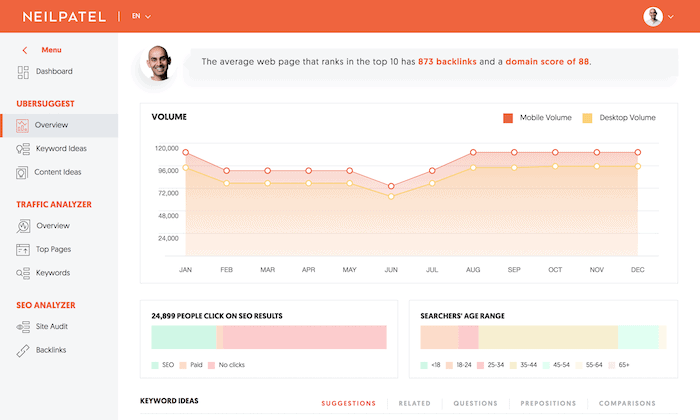
Features of Ubersuggest:
- Tells you where your traffic is coming from
- Provides a list of top 100 Google search results for any given keywords with detailed insights
- Allows you to see device-search volume, type of search, and other target-audience specific insights
- Serves as a link building tool
- Shows top-performing content for targeted keywords
4) SEMrush
SEMrush is one of the giants in the SEO tools space, and has the potential to bring in unmatched results.
This is a gold-standard keyword tool for affiliate marketers, due to the sheer number of features and insights it offers. SEMrush not only helps marketers and affiliates do keyword research, but also allows them to base entire content marketing strategies on these insights.
While SEMrush is pricier than many options on the market, if you can afford the subscription, you should go for it. This tool, however, can be overwhelming for beginners who are still exploring and learning more about SEO.
It is probably best for marketers with an intermediate to expert level of SEO knowledge.
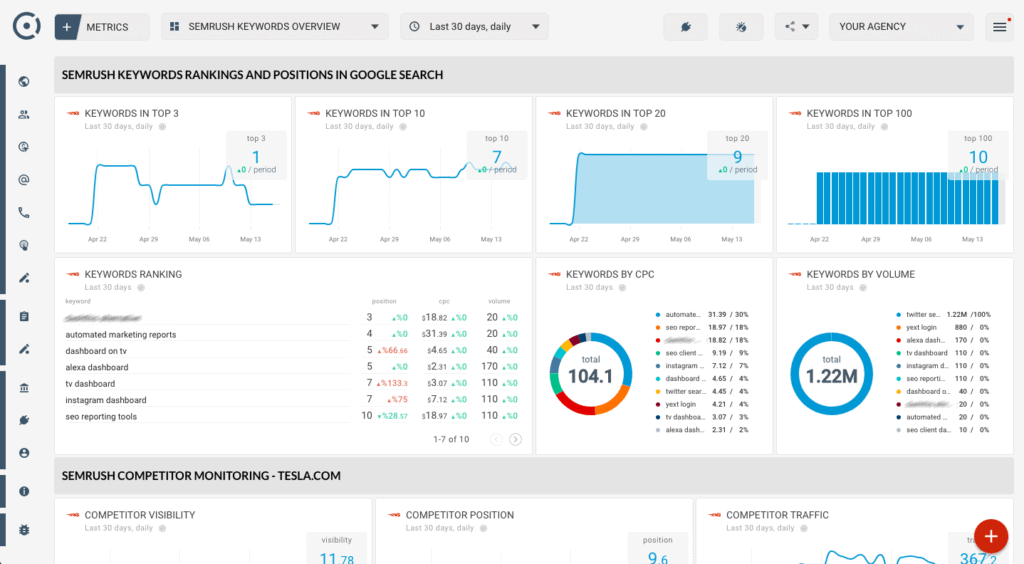
Features of SEMrush:
- Provides detailed insights into search volume, competition, and history of any keyword’s popularity
- Enables on-page SEO audits
- Allows you to analyze your competitor website’s backlink profile and keyword strategy
- Analyzes competitor traffic and audience
- Provides insights into how you can strengthen your backlink profile
- Helps you deep-dive into competitor research and optimize your keyword strategy
5) Ahrefs
Ahrefs is another keyword tool that has an insane following in the SEO world. Many experts (including me!) swear by this tool because of its breadth and depth.
Similar to SEMrush, Ahrefs provides detailed insights on everything from competitor keywords to link profiles to keyword suggestions, allowing you to make crucial SEO and keyword research decisions for your site.
This tool is also best for intermediate or expert affiliate marketers in the SEO space. Since the price point for this tool is on the higher side, I suggest that you get your feet wet with some more affordable tools first.
But once you have the skill and budget for it, Ahrefs will help you unleash the true potential of your website and help you rank it higher, faster.
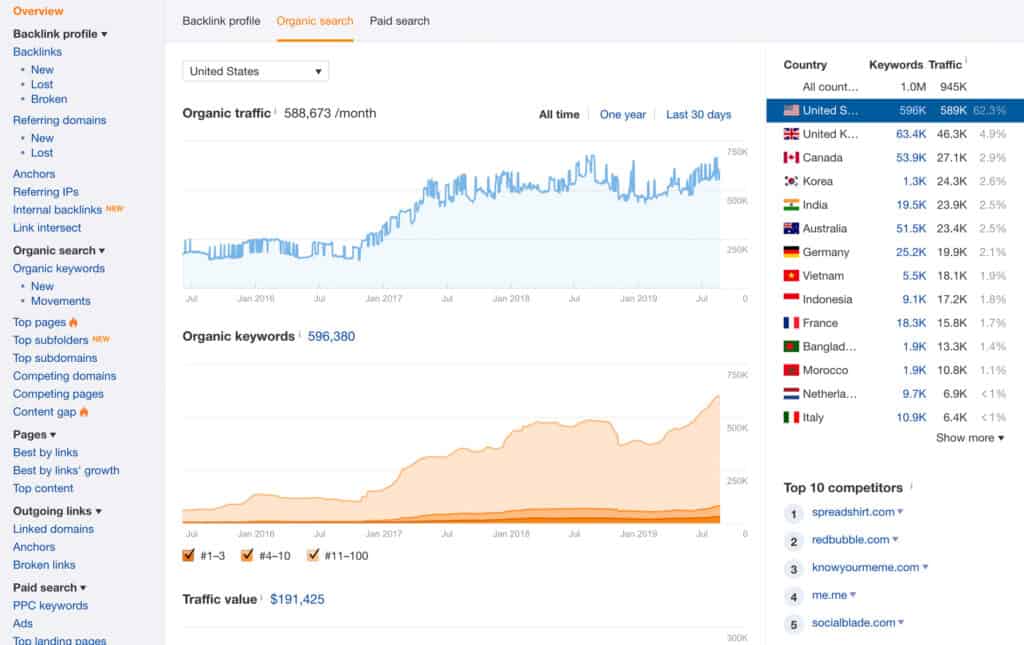
Features of Ahrefs:
- Gives precise insights into keyword difficulty score
- Shows estimated nos. of clicks on the chosen keyword
- Helps you conduct keyword research for 10 search engines
- Provides a detailed search history for any chosen keyword
- Gives you an updated back link popularity graph every day
- Gives you country-specific details about keyword traffic
How to Find Keywords for Affiliate Marketing
As a newbie in the affiliate blogging space, it can be confusing where to start, and how to approach keyword research.
So, here are a few steps to get you going!
Step 1: Choose Affiliate Products in Your Niche
As mentioned at the very beginning of this post, the very first thing you need to do is finalize a niche and then design a website.
Let’s say you have selected the ‘pet’ niche. Your next step is browsing affiliates networks like ClickBank or Amazon Associates to find pet-specific products that you want to promote in your contenet.
You can sign up for ClickBank’s affiliate marketing program for free and start your journey in a few clicks! In fact, ClickBank will personalize your experience based on your objective and level of know-how.
And don’t forget, within the pet niche also, you can pick a sub-niche for a more focused approach, such as only cat products or only toys for pets. The sky’s the limit, really!
Step 2: Discover Profitable Keywords With SEO Tool
Once you have your niche ready, it’s time to find some profitable keywords that will make you money! To do this, you first must come up with all the types of products that are used by pet-owners and are relevant for this niche.
Once you have this list, it’ll be easy to come up with:
- Comparison posts (x vs y)
- Product reviews (z review)
- Buying guides (top 10 products of a specific type)
One of the best affiliate marketing tips to follow is to come up with unique topics to write on than what is already written and published on Google. The way you can come up with unique topics is to develop a strong keyword research strategy where your keywords can allow you to create content that ranks easily, provides value to your readers, and is focused on ‘buyer’s intent.’
Ideally, keywords that have lower difficulty/competitiveness and higher volume are the best keywords to target (ideally 1000 MSV or more).
One way to gauge competitiveness is to see that at least one of the site’s domain ratings is lower than your website rating. Also, do competitor research for backlink profiles using one of the tools we spoke about. It will help you determine how your backlink profile should look to compete for specific keywords.
Step 3: Write Quality Content
Your keyword research forms the basis of your content strategy. As mentioned previously, 80% of your keywords should be transactional in nature so that your ‘buyer intent’ is intact.
However, to build the authority and trustworthiness of your website, we also need to sprinkle 20% of purely informational/educational keywords in the mix.
Based on these keywords, automatically 80% of your content will be transactional and the rest 20%, informational. Do note that the informational blogs will rarely produce any sales as the articles are directed towards a more generalized audience, as compared to buyers specifically.
This is also a reason why we have the 80/20 ratio. But you can customize this ratio according to your strategy and findings!
Step 4: Optimize and Publish Articles
While writing articles for your website, you need to follow SEO best practices published by Google and publish them as soon as possible so that Google can crawl and index them. Once they’ve been indexed, you can start to rank for the targeted keywords, although it will likely take time.
One of the noteworthy aspects of SEO affiliate marketing is that you need to be patient and consistent with your posting. In fact, along with publishing new content, you should also continue optimizing your older content so that it remains relevant for the audience and aligned with the SEO best practices!
Once your pages begin to rank for valuable keywords in the search and people begin buying from your affiliate links, you will start to make money!
Step 5: Refine Your Affiliate Marketing Campaign
Just like your blog, your affiliate marketing campaign also needs to be reviewed and refined constantly. Take a look at how your content is performing using a tool like Google Analytics or the built-in reporting inside of your chosen affiliate network, like the ClickBank dashboard.
What type of content is doing well? How can you make double-down on what’s working? Is there anything you can do to existing content to help it perform better, possibly using an on-page optimization tool like Surfer SEO or PageOptimizer Pro?
Answering these questions will help you keep optimizing your affiliate blog and allow you to build a brand and a reputation for yourself among your readers!
Once your blog begins to rank, there’s no looking back – only cashing in ahead!
Affiliate Marketing Keyword Research Wrap-up
Affiliate keyword research is key to success as an SEO affiliate.
If you need more help with organic/SEO, Spark by ClickBank can give you a huge advantage over your peers in this industry! Spark is an e-learning platform for beginners and passionates like yourself! We’ve built this platform to get you on the fast lane towards affiliate marketing success.
One of the most popular Spark courses we’ve launched so far is “Free Traffic Academy,” presented by organic experts Paul Counts and Shreya Banerjee. Check it out for valuable information and key insights into SEO and affiliate business revolving around organic content.
The time to get started is now!







